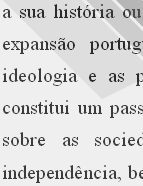

................................
The organisation of Angolan history, written almost exclusively by professional or amateur Portuguese historians, could not be separated from the ideological framework of Portuguese historiography, seeking to prove the existence of an unquestionable Portuguese hegemony, which provided the main axis of the reading of Angolan facts. This history was thus marked by the concealment of Angolans, guiding itself through an inventory of preferential themes, containing facts, regions, and populations according to the 'historical truths' that justified the 'Portugalisation' of Angola.
However, while most authors respected the socio-historical conditions of a colonial Portugal, the writing of Angolan history could not constitute a homogeneous fabric. Three types of historical writings may be identified: the first, totally Lusocentric and dependent on colonial mythology; a second type that, while respecting Lusophone values, sought to 'see' the reality, resorting to archives to organise the historical narrative; and finally, a third, very reduced type, that sought to account for an 'Africanised' Angolan history.
The first type brought together the histories of Angola at the service of Portuguese colonialism. More precisely, this reading of history had two more apparent than real tendencies: the first conceived Angolan history as a kind of limited inclusion in the histories of Portugal and Portuguese expansion, while the Angolans were absent or reduced to the role of minor or exotic appendages to Portuguese operations. The second granted an apparent autonomy to Angolan history, as long as it remained within the framework of the undisputed Portuguese hegemony.
In both António Baião and the group he engaged to undertake the História da Expansão Portuguesa no Mundo [History of Portuguese Expansion in the World] (1937-1940) and Father Silva Rego, who could not detach himself from his missionary vision, minimising the violence of slavery before the superior quality of redemptive baptism, the same colonial rhetoric is found, unwavering and unshaken in the face of the world changes recorded in the organisation of African history from the 1950s onwards.
